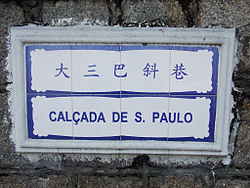This article needs additional citations for verification .(June 2010) |
According to the most comprehensive and updated scientific work done about the topic, the 2025 Ethnologue, The Portuguese language is spoken in Asia exclusively by a very small community of speakers, generally L2 speakers, which amount to approximately 320.000 total users. [1] These speakers are distributed through regions which formerly served as colonies to Portugal, notably Macau and East Timor where the language is official albeit not widely spoken, or spoken by immigrants, notably the Brazilians in Japan, where quite possibly the greatest native Portuguese speaking community in Asia is located, as well as by some Afro-Asians and Luso-Asians. In Larantuka, Indonesia and Daman and Diu, India, Portuguese has a religious connotation. According to the Damanese Portuguese-Indian Association, there are 10 – 12,000 Portuguese speakers in the territory. [2] The ethnologue prognostic, however, is much more grim and suggests Portuguese is almost entirely dying out in India, with only a student community of 1.500 L2 speakers. [3] Statistics regarding this topic are vastly variable, in such a way that the figure of total speakers in Asia can be much higher if one chooses to rely on the East Timorese census data (2015/2022), which points out that up to 30-60% of Timorese people have some capability in portuguese, either at reading, speaking or writing, depending on the source. If this statistic is taken into account, the figure of Asian total speakers of Portuguese can be as high as 1.1 million speakers. The comprehensive study done by Ethnologue however indicates that the proficiency in Portuguese demonstrated by the Timorese may be largely rudimentary and the 63.000 fluent speakers is more certain.


